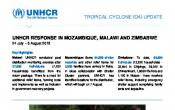Malawi
Operation: Malawi
Location
{"longitude":34,"latitude":-13,"zoom_level":0,"iso_codes":"'MWI'"}
By clicking on the icons on the map, additional information is displayed.
The boundaries and names shown and the designations used on this map do not imply official endorsement or acceptance by the United Nations.
Key Figures
| 2020 planning figures | |
| 100% | of primary school-aged children will be enrolled in primary education |
| 100% | of households will be living in adequate dwellings; |
| 80% | of people of concern with their own business/self-employed for more than 12 months |
| 50% | of laws relating to refugees will be consistent with international standards |
| 150 | people of concern per water tap |
| 2018 year-end results | |
| 100% | of refugees had access to primary health care |
| 100% | of Mozambican asylum-seekers hosted in Luwani camp returned spontaneously with UNHCR’s assistance |
| 100% | of SGBV survivors received appropriate support |
| 100% | of population had optimal access to reproductive health and HIV services |
| 100% | of women were provided with sanitary supplies |
People of Concern
20%
Increase in
2019
2019
| 2019 | 44,622 |
| 2018 | 37,244 |
| 2017 | 35,331 |

[["Refugees",14086],["Asylum-seekers",30299],["Others of concern",237]]
Loading ...
Malawi
< Back
2019
{"categories":[2015,2016,2017,2018,2019,2020],"budget":[6.24625509,14.05602103,18.11807959,17.50133613,15.392054589999999,21.366777510000002],"expenditure":[3.7456183000000003,5.68901108,6.878981860000001,7.71311785,10.45044511,null]}
{"categories":[2015,2016,2017,2018,2019,2020],"p1":[5.712834089999999,14.05602103,18.11807959,17.50133613,13.19496359,21.366777510000002],"p2":[null,null,null,null,null,null],"p3":[null,null,null,null,null,null],"p4":[0.533421,null,null,null,2.197091,null]}
{"categories":[2015,2016,2017,2018,2019,2020],"p1":[3.26069035,5.68901108,6.878981860000001,7.71311785,8.84209521,null],"p2":[null,null,null,null,null,null],"p3":[null,null,null,null,null,null],"p4":[0.48492795,null,null,null,1.6083498999999999,null]}
Loading ...
CHOOSE A YEAR
- 2015
- 2016
- 2017
- 2018
- 2019
- 2020
Operational Environment
Malawi enjoys a stable and democratic political environment and the presidential elections scheduled for May 2019 are anticipated to be peaceful. However, the cost of living and breakdowns in essential social services remain high. This coupled with floods and droughts impacting food security weakens the operational environment for UNHCR.UNHCR coordinates its response with the Ministry of Home Affairs and Internal Security, the government entity responsible for refugee status determination and camp management. UNHCR and partners deliver protection and humanitarian assistance in cooperation with partners to some 35,000 refugees and asylum-seekers hosted in Dzaleka camp.
Dzaleka refugee camp was originally built for 10,000 people, but is currently hosting over 35,000 refugees and asylum-seekers, resulting in urgent need of decongestion. The number of new asylum-seekers, particularly from the Democratic Republic of Congo, is expected to increase in 2019 due to continued instability and violence in the country, potentially putting a further strain on the existing infrastructure. The total number of people of concern to UNHCR in 2019 is estimated at 55,000.
Despite the increase in some population groups of concern, for others durable solutions have been found. Some 2,600 Mozambican asylum-seekers returned from Luwani camp to Mozambique in late September 2018 as a result of the peace process.
The Government of Malawi supports the refugee response through the provision land and personnel. UNHCR has developed partnerships with the private sector, civil society, NGOs and government bodies. UNHCR is advocating for the inclusion of its people of concern into national mechanisms of protection, as well as seeking to strengthen linkages to the development sector.
As a Comprehensive Refugee Response Framework (CRRF) roll-out country, UNHCR is pursuing the CRRF approach in Malawi. Enhanced inclusion of refugees has been included in the forthcoming national development plan, as well as in the UNDAF 2019–2022. Furthermore, a multi-year, multi-partner protection and solutions strategy has been developed, entailing legislative action, a relaxation of the encampment policy and improving the public perception towards refugees. The strategy seizes on a number of opportunities that have emerged recently within the Government, private sector and the UN Country Team, alongside innovative donor support.
Key Priorities
In 2019, UNHCR will focus on:- Inclusion of refugees in the national health and education sectors;
- Improving access to quality education through enhancing of the capacity of teachers and provision of learning materials;
- Decongestion of Dzaleka refugee camp, including a phased relocation of people of concern to a suitable settlement site, once identified by the Government;
- Achieving self-reliance through the enhancing of livelihood activities aimed at empowering people of concern.
















